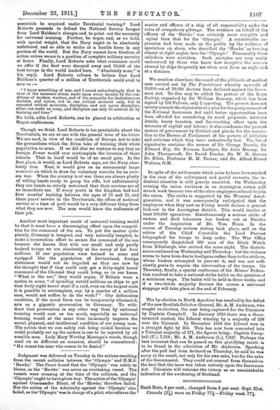In spite of the settlements which seem to have been
reached in the case of the railwaymen and postal servants, the in- dustrial situation is still gravely unsettled. On Wednesday evening the union workmen in an Accrington cotton mill struck work because two of the other employees refused to join the union. The strike is supported by the Weavers' Amal- gamation, and it was consequently anticipated that the employers when they met on Friday would declare a general lock-out in the Accrington district. This would involve at least 100,000 operatives. Simultaneously a serious strike of carters and dock labourers has broken out at Dundee under the inspiration of Mr. Tom Mann. In the course of Tuesday serious rioting took place, and on the advice of the Chief Constable the Lord Provost telegraphed for troops to keep order. The War Office consequently despatched 300 men of the Black Watch from Edinburgh, who arrived the same night. The disturb- ances continued on Wednesday and Thursday ; but the violence seems to have been due to hooligans rather than to the strikers, whose leaders attempted to prevent it, and was not suffi- ciently grave to require the intervention of the troops. On Thursday, finally, a special conference of the Miners' Federa- tion resolved to take a national strike ballot on the question of a minimum wage. The ballot will be held in three weeks, and if a two-thirds majority favours the course a universal stoppage will take place at the end of February.


































 Previous page
Previous page